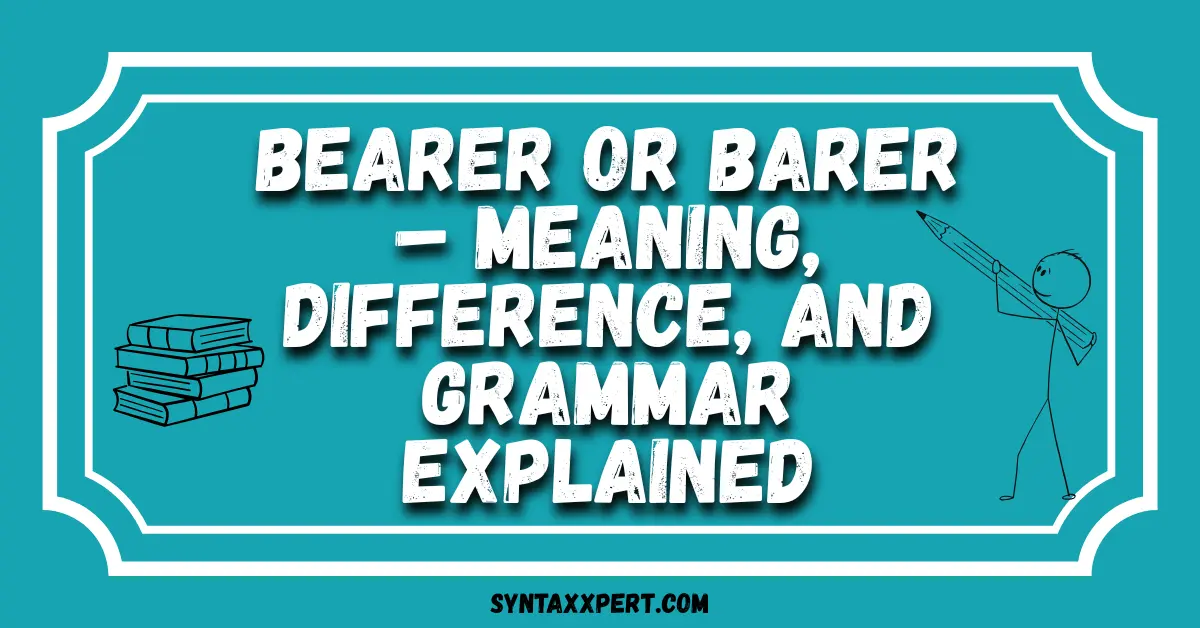Have you ever paused mid-sentence wondering, “Is it bearer or barer?” You’re not the only one. These two words sound the same but differ completely in meaning and grammatical use. In English, such words are called homophones — words that share pronunciation but have distinct meanings and spellings.
In this guide, we’ll uncover every detail: definitions, usage, grammatical roles, origins, examples, and even the psychological tricks to remember the difference. By the end, you’ll never confuse “bearer” and “barer” again.
Understanding the Homophone Pair: Bearer vs Barer
The English language is full of tricky pairs — “bare” and “bear,” “their” and “there,” “peace” and “piece.” Similarly, “bearer” and “barer” belong to that same category of confusing homophones.
Though they sound identical, they represent entirely different ideas.
| Word | Part of Speech | Definition | Example |
| Bearer | Noun | A person or thing that carries or holds something | The bearer of bad news walked in solemnly. |
| Barer | Adjective (Comparative) | More exposed or less covered | As autumn came, the trees looked barer. |
Detailed Meaning of “Bearer”
The word bearer originates from the verb to bear, meaning to carry, support, or endure. It’s most commonly used as a noun to describe someone who carries something—whether that’s a message, an object, or a symbolic burden.
Common Contexts of “Bearer”
- Formal Communication:
- The bearer of this letter is authorized to collect your parcel.
- Here, “bearer” refers to a messenger or representative.
- Finance and Documentation:
- Bearer bonds or bearer cheques are negotiable instruments—owned by whoever physically holds them.
- Example: This cheque is payable to the bearer on demand.
- Ceremonial and Symbolic Roles:
- Flag bearer, torch bearer, pall bearer — each refers to a role of honor and responsibility.
- Example: She was the flag bearer at the Olympic opening ceremony.
- Metaphorical Usage:
- Sometimes used symbolically: He was the bearer of truth and justice.
Synonyms for “Bearer”
- Carrier
- Messenger
- Courier
- Holder
- Conveyor
- Representative
In-Depth Meaning of “Barer”
Barer, on the other hand, is not a noun—it’s an adjective, specifically the comparative form of “bare.”
“Bare” means uncovered, naked, or exposed. So, “barer” means more uncovered or more exposed.
Example Sentences
- After the storm, the landscape looked barer than ever.
- He trimmed the garden, leaving the branches barer.
- Her face felt barer without makeup.
In short: 👉 Barer = more exposed. 👉 Bearer = someone who carries.
Synonyms for “Barer”
- More naked
- More uncovered
- More exposed
- More empty
Grammatical Function and Word Type
| Word | Root | Part of Speech | Function | Example |
| Bearer | Bear | Noun | Describes a person or object performing the action of carrying | The bearer delivered the message. |
| Barer | Bare | Comparative Adjective | Describes the degree of exposure | The room was barer after removing the furniture. |
This distinction is crucial because misusing one can alter the entire meaning of a sentence.
Common Mistakes with “Bearer” and “Barer”
Mistakes with this pair are surprisingly frequent, even among native English speakers. Here are a few examples:
| Incorrect | Correct | Explanation |
| The barer of gifts smiled brightly. | The bearer of gifts smiled brightly. | “Barer” cannot carry gifts; “bearer” does. |
| Her arms were bearer than his. | Her arms were barer than his. | “Barer” is a comparative adjective; “bearer” is not. |
| I am the barer of this note. | I am the bearer of this note. | Always “bearer” when referring to carrying something. |
Etymology: Tracing the Origins
Both words come from distinct linguistic paths:
- Bearer → Derived from Old English beran (“to carry or endure”).
- Related words: bearable, bearing, birth (as in “to bear a child”).
- Barer → Comes from Old English bær (“naked” or “uncovered”).
- Related words: bareness, barefaced, barefoot.
Despite sounding alike, they’ve evolved separately for over a thousand years.
Visual Grammar Tip
Think of it this way:
🧍♂️A bearer carries. 🌳A barer shows more.
Simple, right?
If there’s action or responsibility involved—bearer is your word. If there’s exposure or description—barer fits perfectly.
Mnemonic to Remember
Use this easy memory hack:
“The bearer bears things; the barer bares skin.”
By linking each word to its root verb (bear vs. bare), you’ll instantly recall which one fits your context.
Real-World Examples from Literature
Let’s look at how both words are used in real writing:
Bearer:
- “The bearer of this letter will inform you of my situation.” — Jane Austen
- “Every torch bearer of knowledge has a duty to light others’ paths.”
Barer:
- “The trees stood barer against the winter sky.”
- “Each confession left his soul barer than before.”
Literary contexts often highlight emotional or descriptive contrasts—making “barer” a poetic choice.
Homophones Similar to “Bearer” and “Barer”
If you’re learning English, it helps to know other confusing homophones:
| Word Pair | Difference |
| Bare vs. Bear | Bare = uncovered; Bear = carry or endure |
| Sight vs. Site | Sight = vision; Site = location |
| Write vs. Right | Write = compose; Right = correct or direction |
| Flour vs. Flower | Flour = baking ingredient; Flower = plant blossom |
These pairs illustrate how English pronunciation often outpaces spelling consistency.
Examples in Different Contexts
| Context | Example with Bearer | Example with Barer |
| Business | The bearer of the cheque can cash it immediately. | — |
| Ceremonial | The torch bearer led the march. | — |
| Descriptive | — | The mountain peaks looked barer after the snow melted. |
| Symbolic | He was the bearer of hope during tough times. | — |
When to Use Bearer vs Barer in Writing
Use bearer when referring to:
- A person carrying something — “The bearer of the crown.”
- Official documents or titles — “Bearer bonds.”
Use barer when describing:
- Physical exposure — “The walls grew barer each day.”
- Comparative appearances — “The tree branches were barer after pruning.”
READ MORE >>> Casi Algo Meaning: The Truth Behind This Viral Spanish Phrase
Quick Recap
| Aspect | Bearer | Barer |
| Type | Noun | Comparative Adjective |
| Meaning | One who carries or conveys | More exposed or uncovered |
| Root Word | Bear | Bare |
| Common Contexts | Formal, ceremonial, symbolic | Descriptive, visual, poetic |
| Example | Bearer of the letter | Barer landscape |
Frequently Asked Questions
What is the main difference between bearer or barer?
“Bearer” refers to a person or thing that carries something. “Barer” means more uncovered or exposed.
Is “barer” a real word?
Yes, it’s the comparative form of “bare.” Though rare, it’s grammatically correct.
Can I use “bearer” for people only?
Mostly yes, but it can also apply symbolically (like “truth-bearer”) or formally (like “bearer bond”).
Are bearer or barer homophones?
Exactly — they sound the same but differ in spelling and meaning.
How can I remember the difference easily?
Remember: “The bearer bears things, while the barer bares them.”
Conclusion
In essence, both words—bearer or barer—are simple yet often misused. The confusion arises because English pronunciation doesn’t always reflect spelling. But once you remember their roots, it’s easy:
- Bearer = carries.
- Barer = exposes.
Master this pair and you’ll strengthen your grasp of English homophones for good.

I’m Luna Hazel, a grammar expert here to help you master the art of clear, confident writing. Let’s make every word count!

